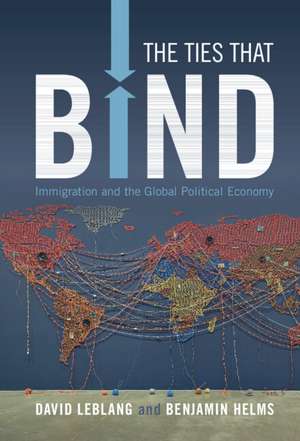The Ties That Bind: Immigration and the Global Political Economy
Autor David Leblang, Benjamin Helmsen Limba Engleză Paperback – 8 feb 2023
| Toate formatele și edițiile | Preț | Express |
|---|---|---|
| Paperback (1) | 203.89 lei 6-8 săpt. | |
| Cambridge University Press – 8 feb 2023 | 203.89 lei 6-8 săpt. | |
| Hardback (1) | 527.45 lei 6-8 săpt. | |
| Cambridge University Press – 8 feb 2023 | 527.45 lei 6-8 săpt. |
Preț: 203.89 lei
Nou
Puncte Express: 306
Preț estimativ în valută:
39.02€ • 40.31$ • 32.47£
39.02€ • 40.31$ • 32.47£
Carte tipărită la comandă
Livrare economică 26 martie-09 aprilie
Preluare comenzi: 021 569.72.76
Specificații
ISBN-13: 9781009233279
ISBN-10: 1009233270
Pagini: 278
Dimensiuni: 152 x 228 x 15 mm
Greutate: 0.37 kg
Editura: Cambridge University Press
Colecția Cambridge University Press
Locul publicării:New York, United States
ISBN-10: 1009233270
Pagini: 278
Dimensiuni: 152 x 228 x 15 mm
Greutate: 0.37 kg
Editura: Cambridge University Press
Colecția Cambridge University Press
Locul publicării:New York, United States
Cuprins
1. Introduction: immigration and globalization; 2. Origins: why do people migrate?; 3. Destinations: where do migrants go?; 4. Diaspora bonds: global migration and international investment; 5. Origin statecraft: remittances and diaspora engagement; 6. Destination statecraft: labor market policy and the regulation of migration; 7. Conclusion: migration and the future of globalization.
Recenzii
'Migration has often been ignored in international political economy, and Leblang and Helms provide a terrific corrective to this blind spot. Tracing the migration process from the decision to leave through where to go and whether to send back remittances, they convincingly show that politics-not just economic or social factors-affects every step in the migration process. Leblang and Helms then turn from explaining the migration process to demonstrating that migrants are the glue that helps hold global finance together. This book is a must-read not only for migration scholars but for all those interested in the global economy.' Margaret Peters, UCLA
'The Ties That Bind is a powerful book showing how political institutions intimately shape each part of the process by which people (legally) move to another country. The book argues that such international migration benefits both migrant-sending and -receiving countries, largely because migrants are crucial facilitators of international capital flows. The authors develop important new ideas about policies that help sending and receiving countries reap these benefits while managing migrant flows.' Helen V. Milner, B.C. Forbes Professor of Public and International Affairs, Princeton School of Public and International Affairs
'This book sheds fresh light on the political economy of international migration. Leblang and Helms conduct a sweeping and insightful analysis of the political factors that lead people to migrate and influence where they choose to relocate. They also persuasively demonstrate that international migration plays a crucial role in shaping the global political economy. Combining clear and sharp theorizing with rigorous data analysis, this is a study that a wide range of social scientists will benefit from reading.' Edward D. Mansfield, Hum Rosen Professor of Political Science
'Can international migration be the glue that binds the global political economy together, benefiting both migrant-sending and -receiving countries? Yes. But it depends. In The Ties That Bind, Leblang and Helms masterfully demonstrate with a wealth of data how politics and institutions, such as migrant rights and dual citizenship, determine migration intentions, where people migrate to, and how migrants remain connected to their homelands. A must-read for scholars and global policy-makers.' Maarten Vink, Chair in Citizenship Studies, European University Institute
'The Ties That Bind is a powerful book showing how political institutions intimately shape each part of the process by which people (legally) move to another country. The book argues that such international migration benefits both migrant-sending and -receiving countries, largely because migrants are crucial facilitators of international capital flows. The authors develop important new ideas about policies that help sending and receiving countries reap these benefits while managing migrant flows.' Helen V. Milner, B.C. Forbes Professor of Public and International Affairs, Princeton School of Public and International Affairs
'This book sheds fresh light on the political economy of international migration. Leblang and Helms conduct a sweeping and insightful analysis of the political factors that lead people to migrate and influence where they choose to relocate. They also persuasively demonstrate that international migration plays a crucial role in shaping the global political economy. Combining clear and sharp theorizing with rigorous data analysis, this is a study that a wide range of social scientists will benefit from reading.' Edward D. Mansfield, Hum Rosen Professor of Political Science
'Can international migration be the glue that binds the global political economy together, benefiting both migrant-sending and -receiving countries? Yes. But it depends. In The Ties That Bind, Leblang and Helms masterfully demonstrate with a wealth of data how politics and institutions, such as migrant rights and dual citizenship, determine migration intentions, where people migrate to, and how migrants remain connected to their homelands. A must-read for scholars and global policy-makers.' Maarten Vink, Chair in Citizenship Studies, European University Institute
Notă biografică
Descriere
Immigration integral to globalization, creating connections and mobilizing investments in human and financial capital across countries.
